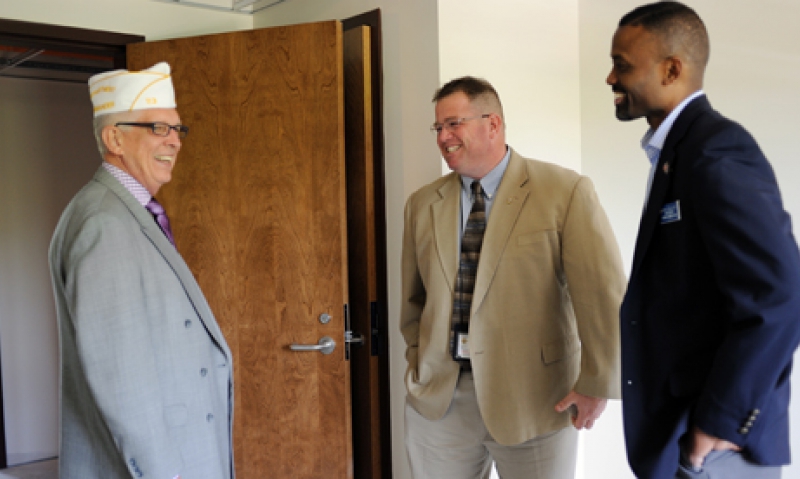
When a transitional housing residence for homeless veterans in New Jersey hit a snag in construction costs, Legion family members in the state sprang to action.
To help him end veteran homlessness, Department of Veterans Affairs Secretary Eric Shinseki asked communities and local governments to join in the fight and help shepherd those who have served back into the society they fought to protect.
That call to action resonated with Legionnaires in New Jersey. Rallied by their department leadership's advocacy, Legion family members from the Garden State reached deep into their pockets to fund furnishings for a state homeless veterans housing center that was experiencing financial uncertainty amid expansion. Veterans Haven, which provides transitional housing to veterans who have fallen on hard times, underwent a massive construction project this summer that added a new 44-apartment residential building to its premises. The addition was largely made possible by Legionnaires, Sons of The American Legion squadrons and Auxiliary members throughout the state who donated nearly $165,000 to the project so that the housing wing could be properly furnished. The building will officially be unveiled Oct. 27 at a ribbon-cutting ceremony.
"The American Legion has stepped up hugely," says Sean Van Lew, superintendent of Veterans Haven. "When we began construction, a lot of the money we had set aside for amenities and furniture in rooms was consumed in the construction process.
"With that money from the Legion, we are able to purchase brand new bedroom furniture for all 44 rooms, computers and computer accessories for our computer room, new office furniture, and equipment for the conference center."
The donation drive was a personal project of Past Department Commander Bob Looby, who learned of Veterans Haven's swelling construction costs and decided to make them a focus of his tenure. Working with officials from the facility, Looby and department leadership devised a system where a donation of $2,000 to cover the furnishing costs of an entire apartment would allow the apartment to be named in honor of the person or group that made the donation. Legionnaires and posts who donated the amount are recognized with a plaque at the entrance of the apartment in which their contribution paid for the furnishings.
When the $88,000 mark was reached to cover furniture in each apartment, the Legion moved onto funding other amenities for the facility, such as computers, recreation equipment and other household appliances.
"It grew from bedrooms to us furnishing every piece of furniture in the building," Looby says.
Located in Winslow, N.J., Veterans Haven is a public facility that is funded by state and federal entities, including VA and Department of Housing and Urban Development. Residents are funneled into its confines by VA, which evaluates veterans and deems them eligible for transitional housing. Veterans who wish to reside in Veterans Haven must agree to adhere to the facility's long-term program.
That commitment entails not only finding steady employment but becoming a productive member of society. The facility tries to make that goal as reachable as possible, employing a 24-hour staff that includes health-care professionals and vocational counselors who can procure jobs for the residents.
"We've had guys who we just got jobs flipping burgers down the street at Checkers," Van Lew says. "Next thing you know, they're a regional manager there."
Veterans Haven has what it deems about a 75-percent success rate in transitioning its residents into society. That transition usually includes some form of recovery, as veterans who live there often have backgrounds with substance abuse problems, Van Lew says. During their stay, they're randomly drug tested and expected to remain clean. Eventually, as they find employment, they're given more responsibilities, such as earmarking a portion of their wages as rent and developing a savings account that facility counselors help them manage.
They leave the facility not only back on their feet, but on a trajectory toward leading a productive life.
"Most these guys, all they need is a chance," Van Lew says.
Thanks to the new building, the facility will be able to almost double its resident capacity.
Aptly named, Veterans Haven is a haven of sorts from the "hustle and bustle" atmosphere that encapsulates the tri-state area. It's located in a sparsely populated area of New Jersey in somewhat rural surroundings.
Van Lew says the facility's location has been paramount to its success.
"It's really important to get the guys away from that temptation and out of that environment," he says. "It's good to give the guys an environment where they can focus on what they're here for, away from any triggers that might set them off."
But Veterans Haven wasn't so far off the beaten path that it escaped Looby's radar. During his year as department commander, he made raising money for it a focus, stressing it during every official visit he made to counties in New Jersey. He and his staff used social networking and newsletters to get the word out that construction on a housing project for homeless veterans could potentially be halted because of unanticipated costs.
Legion family members in New Jersey sprung to action, donating what the state Department of Military and Veterans Affairs says is the highest amount ever raised by a veterans service organization.
"I think homelessness among veterans is something that is always on the minds of all veterans, especially of the Vietnam era," Looby says. "It's at a crisis level now."
An Army veteran who deals with homeless veterans on a daily basis, Van Lew can only agree.
"There's a need to help the homeless veteran population," he says. "It's the least we can do for people who laid their lives on the line to protect the freedoms that we all live with every day. The least we can do is to try to help them be successful."
- Homeless Veterans

